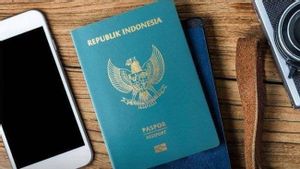JAKARTA The material phenomenon is believed to provide benefits for both parties, both in terms of sellers and buyers. The seller gets money from the services he offers, while the buyer can get the desired item without having to spend more time. However, this business is considered illegal and detrimental to the state.
Jastip or entrusted services are one of the phenomena whose popularity continues to climb along with technological developments. Jastip is increasingly viral as social media users in Indonesia increase and is in great demand by millennials. Sufficiently with smartphone capital and internet connections, businesses can be run with various applications on social media.
Quoting Kompas, a deposit or deposit service is an informal service that offers assistance to people who need it or want to buy something but cannot go to the desired place for various reasons. Competitive promotions are carried out through social media such as Facebook, Instagram, or WhatsApp.
Jastip is considered a lucrative form of business, because people who open this business do not need large capital. But it should be noted, running a Jastip business must know how to calculate profits properly. Usually, the big profit taken for the supply business is 20 percent of the price of each item.
Jastip business is synonymous with imported goods from abroad such as shoes, bags, cosmetics, clothes, and children's equipment. However, nowadays many of these business people are also opening the suit of domestic goods.
Goods from imported book exhibitions, household products, or goods at shopping centers are among the most often entrusted. The interest of goods from within the country is also not inferior to imported products.
"Jastip in this country has many opportunities, especially if there is a sale in a shop. I once sent goods to the Payakumbuh City area in West Sumatra, West Kotawaringin Regency in Central Kalimantan, and many more," said Jastip business actor, Putri.
But recently, the Jastip business, especially from abroad, was in the spotlight because it was said to be detrimental to the state. This was conveyed by the Director General of Customs and Excise at the Ministry of Finance, Askolani. He said the Jamptip business caused losses because the perpetrators should have paid taxes and import duties.
According to him, goods that enter Indonesia without being taxed seem to be cheaper and this is considered unfair for other business actors who enter goods legally.
"If you don't pay the import duty as if the goods are cheaper. It's not fair, we have to protect it," explained Askolani.
The trend of growing demand turns out to make business actors in the country nervous. The imported goods are said to have entered illegally because they are not collected from import duties and have the potential to damage the domestic market. This was revealed by the General Chairperson of the Indonesian Retail Rulers Association (Aprindo) Roy Nicholas Mendey.
SEE ALSO:
"We strongly criticize Java, because Jastip is an illegal business. Jastip is not included in Indonesia on official channels, does not meet taxes," Roy said at an Aprindo press conference in Jakarta, Thursday (18/1/2024).
"The inclusion of the laptop was a black market, expensive clothes, expensive bags, expensive electronics were put in his bag (or) cargo, as if it were his own property. Even though when someone left the airport, someone took it and passed the tax, through the legal mechanism, it was not fulfilled," he continued.
Jastip is part of the passenger's luggage whose provisions are stated in the Minister of Finance Regulation (PMK) 203/2017. In this regulation, imports of passenger goods are divided into personal uses. Personal use items will get exemption from import duties with the amount Free On Board (FOB) worth 500 US dollars per passenger.
Goods imported under the Jastip scheme are categorized as non-personal use items, so that the completion of customs obligations does not receive exemption facilities such as passenger personal goods.
The rise of the trade business from abroad has made the Ministry of Trade (Kemendag) say that this service will receive strict supervision through new regulations. The Director General of Domestic Trade, Isy Karim, said that the Jattip business is receiving the full attention of the government. Supervision of the suit is one of the efforts to tighten the flow of imports that disrupt micro, small and medium enterprises (MSMEs).
Responding to the pros and cons of the Jastip business, the lecturer and economic observer of Pasundan University, Acuviarta Kartabi spoke up. He agreed that the practice of punct was taxed, but there must be a clear classification because on the one hand the phenomenon of suitably boosting the economy and prospering the country.
"Please impose a tax if the person concerned is indeed a supplier business, not just temporary, but a routine activity. But passengers who only occasionally go abroad and their goods are taxed, I don't think it's fair," he explained, citing the Unpas website.
The English, Chinese, Japanese, Arabic, and French versions are automatically generated by the AI. So there may still be inaccuracies in translating, please always see Indonesian as our main language. (system supported by DigitalSiber.id)


















